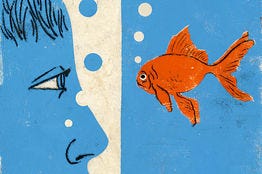I posted this to tiktok yesterday and thought it would make a good intro for this post.
My personal journey through ‘conscious consumerism’ has been long and winding and not linear. I succumb to the infamous knowledge-action gap like the imperfect human I am, navigating a variety of conflicting constraints, desires, and impulses when it comes to aligning my purchases with my values.
That said, I have a lot of grace for myself and others on the journey to consume more consciously because the consumer culture around us— which convinces us to consume more and faster and all the time— is SO POWERFUL. It’s a rip current we exhaust ourselves attempting to swim through.
I understand the exhaust. And I also understand the sentiment that everyone is just doing whatever they can to get by in this life. But still, I get pretty fired up when I think of the negative consequences of our consumption-above-all-else economy — exhibits a, b, and c.
That’s why I have passion around discussing the nuances of this topic.
What is conscious consumerism?
Many months ago I made a video trying to define conscious consumerism.
To borrow from David Foster Wallace: Consumer culture is like water. And we are like fish, who live our entire lives in water, but don’t always notice how it surrounds us or impacts us.

We constantly define ourselves and others by the possessions we own, don’t own, or wish to own. We spend tons of time and money thinking about the things we’re going to buy, how we’re going to acquire these things, and then what we’re going to do with them when their use to us has run out.
Consumer patterns are so engrained in the world around us that we hardly realize the swirl of implications that all of these decisions have on us or the world around us.
Conscious consumerism brings that unconscious swirl to a level of awareness. Being aware— being conscious — allows you to make consumption decisions that support the type of world you want to see; that you can feel good about.
Sometimes conscious consumerism means purchasing less; sometimes it means adopting more sustainable behaviors; sometimes it means supporting policies that affect issues you care about at a more structural level, sometimes you become an advocate for healthier consumerism within a large corporation (using your power for good); or sometimes you share you learnings about conscious consumerism with friends over lunch (or on social media…)
Conscious consumerism isn’t about accepting blame or feeling shame; conscious consumerism is about practicing awareness of our existence in this crazy-making consumer culture we all find ourselves in. Conscious consumerism is actively taking responsibility for the choices (and consequences) of the choices in front of you. It’s not a one-size all fits solution… your practice of consuming consciously is context dependent — on life stage, income, ability, and so many other circumstances.
Conscious consumerism takes many forms.
But wait… isn’t this newsletter called “Not a Consumer”? I mean, come on Sarah which is it... be a conscious consumer or be not a consumer? And can our identity really be found in what we claim we are not?
Ok fair point. To me, the concepts are related and depend on one another. I think that a practice of consuming more consciously results in becoming ‘not a consumer’. Everything in our culture and economic system pushes us towards consumption. We derive pleasure and social and cultural value from objects used as signals, displayed for others to see. When we become conscious consumers, we thoughtfully consider that this is how our social/economic system works… and how we want to engage.
If we eschew this system as a defining factor of our self identity and value and worth, we may choose to identify as… anything other than a consumer. Literally anything. A painter. A mother. A friend. A gardener. A teacher. A cyclist. A reader. A volunteer. A creator. And the list can go on.
When we are ‘not a consumer’ we will still buy things. We will still find joy in hobbies and crafts and experiences that require materialism. We will still have fun with design and personal style and create spaces and outfits and recipes that bring us pleasure. But the things we buy will not hold disproportionate value in our lives. They won’t get in the way of the good stuff.
On Tuesday I briefly mentioned the concept of binary opposition, that meaning comes from difference, that we are better able to define a thing when we also understand what a thing is not. I think that concept applies here. We better understand our relationship to consumerism when we picture what our lives might look like without it.
Conscious consumerism requires nuance and that is why it is a hard idea to sell… or talk about in a rambling substack post. There’s no catchy headline, there’s no hard and fast playbook. Don’t get me wrong, there are some excellent inspirational guides in this space (Voluntary Simplicity, Overdressed, The Story of Stuff, Plenitude, Consumed, The Day the World Stops Shopping). Any of these make a great entry point to the journey.
What I want to communicate most clearly is that consuming consciously is a choice of philosophy, of guiding values.
And only you can answer: What values guide your life? Your consumer patterns?
Are you able to act on those values given your current circumstances?
Are you willing to?





Always great to see you and your writings in my inbox, Sarah!